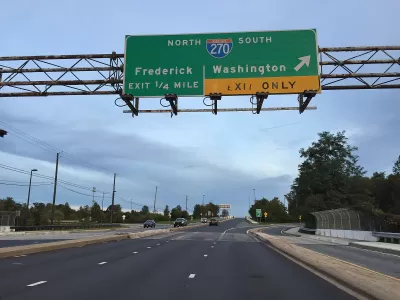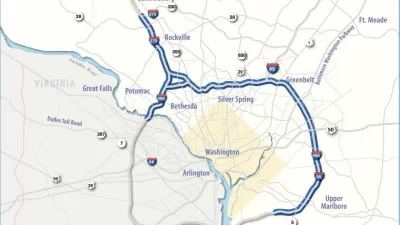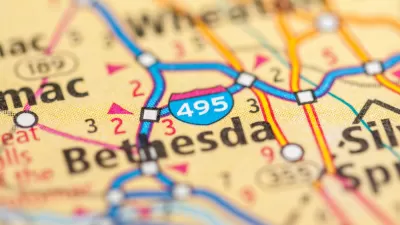The state transit authority has granted preliminary approval to the revised plan to expand the Capital Beltway and add new high-occupancy and toll lanes.

"The Maryland Transit Authority Board granted preliminary approval Tuesday to an amended project that will expand the Beltway around the American Legion Bridge" and "add two high-occupancy toll managed lanes in each direction on the bridge from I-270 to I-370 in the northern region," writes Dominique Maria Bonessi for DCist. "The project would also expand a 12-mile stretch on I-270 from the American Legion Bridge through Gaithersburg. Unlike previous iterations of the Beltway expansion plan, the current proposal does not include the eastern portions of the Beltway in Montgomery and Prince George’s counties."
After releasing a draft Environmental Impact Assessment last year, the agency scaled back the project in May 2021 after "months of opposition from local officials, residents and environmental advocates." The proposal "thas faced numerous criticisms in recent years, as the project worked through its draft environmental impact statement and went out to bid," including "concerns about uncertain environmental impacts, a lack of transit plans in the project, and the potential failure of another public-private partnership."
Director of the Maryland Department of Transportation and chair of the transit board Greg Slater "told board members in a virtual meeting that the current project does not displace any properties, exists mostly within its current footprint, and increases the throughput of cars in 2045 by up to 50%."
FULL STORY: Maryland’s Transit Authority Grants Preliminary Approval To Amended Beltway Project

Alabama: Trump Terminates Settlements for Black Communities Harmed By Raw Sewage
Trump deemed the landmark civil rights agreement “illegal DEI and environmental justice policy.”

Study: Maui’s Plan to Convert Vacation Rentals to Long-Term Housing Could Cause Nearly $1 Billion Economic Loss
The plan would reduce visitor accommodation by 25% resulting in 1,900 jobs lost.

Why Should We Subsidize Public Transportation?
Many public transit agencies face financial stress due to rising costs, declining fare revenue, and declining subsidies. Transit advocates must provide a strong business case for increasing public transit funding.

Paris Bike Boom Leads to Steep Drop in Air Pollution
The French city’s air quality has improved dramatically in the past 20 years, coinciding with a growth in cycling.

Why Housing Costs More to Build in California Than in Texas
Hard costs like labor and materials combined with ‘soft’ costs such as permitting make building in the San Francisco Bay Area almost three times as costly as in Texas cities.

San Diego County Sees a Rise in Urban Coyotes
San Diego County experiences a rise in urban coyotes, as sightings become prevalent throughout its urban neighbourhoods and surrounding areas.
Urban Design for Planners 1: Software Tools
This six-course series explores essential urban design concepts using open source software and equips planners with the tools they need to participate fully in the urban design process.
Planning for Universal Design
Learn the tools for implementing Universal Design in planning regulations.
Smith Gee Studio
Alamo Area Metropolitan Planning Organization
City of Santa Clarita
Institute for Housing and Urban Development Studies (IHS)
City of Grandview
Harvard GSD Executive Education
Toledo-Lucas County Plan Commissions
Salt Lake City
NYU Wagner Graduate School of Public Service




























